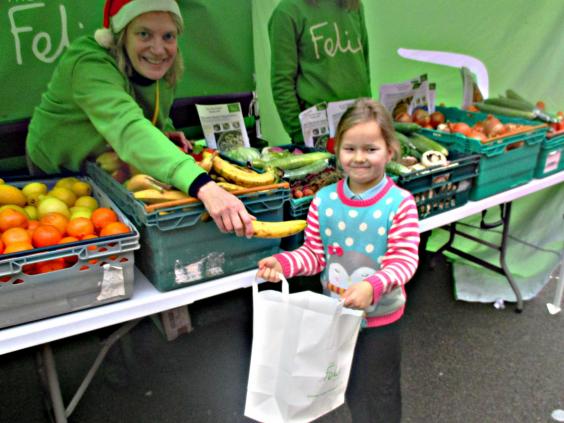Why the ‘food tsar’ will make a real difference to people in food poverty
Because of his privileged background and his business, which caters to well-off people, some have questioned Ben Elliot’s commitment to the cause. They could not be more wrong


Your support helps us to tell the story
From reproductive rights to climate change to Big Tech, The Independent is on the ground when the story is developing. Whether it's investigating the financials of Elon Musk's pro-Trump PAC or producing our latest documentary, 'The A Word', which shines a light on the American women fighting for reproductive rights, we know how important it is to parse out the facts from the messaging.
At such a critical moment in US history, we need reporters on the ground. Your donation allows us to keep sending journalists to speak to both sides of the story.
The Independent is trusted by Americans across the entire political spectrum. And unlike many other quality news outlets, we choose not to lock Americans out of our reporting and analysis with paywalls. We believe quality journalism should be available to everyone, paid for by those who can afford it.
Your support makes all the difference.Not before time, Britain has a “food tsar” – someone specifically tasked with reducing the colossal waste of food in this country. The equivalent of some 250 million meals are thrown away each year, at a time when many households are suffering food poverty and, children in particular, poor nutrition. Now we have someone who is tasked with doing something about it – Ben Elliot, the government’s first food surplus and waste champion.
Because of his privileged background and his business, Quintessentially, which caters to well-off people, some have questioned Ben’s commitment to the cause. They could not be more wrong. As someone who has got to know Ben over the last year, and is a fellow volunteer at food waste charity The Felix Project, I know that he will bring enormous energy and urgency to his unpaid role, with a belief that this waste of good, fresh food is a national scandal. As Ben has said: “As a nation, we need to stop this excessive waste and ensure that surplus food finds its way to people in our society who need it most, and not let it get thrown away and go to landfill.”
For example, on the 500 mile bike ride organised for The Felix Project by the Quintessentially Foundation (the charitable arm of his business) in June, I witnessed first-hand Ben’s enthusiasm and passion for our charity. Each day he would be up at the crack of dawn, always one of the first to get on the bike for the day. His energy is infectious.
For the Felix Project, which is engaged with redistributing food on the front line, he is a regular volunteer who can be seen out on the streets of west London redistributing surplus food to those in need every fortnight in one of our green electric vans.
Through the work of his Quintessentially Foundation, Ben has helped to raise over £13 million for various charities over the years.
Ben and everyone involved in this cause have a high ambition – to stop food waste going to landfill by 2030 and to dramatically increase the amount reaching those in need. Michael Gove, the environment secretary, has set aside £15 million to help get this good food to hungry people, and end what he calls “an economic, environmental and moral scandal”. In the total of public spending it is a small sum, but it can leverage a much greater value of food being delivered to those who need it. Hungry children make for less attentive pupils, for example, and the health problems that can arise from a lack of breakfast or a balanced diet with fresh foodstuffs are obvious. So in regard to educational achievement, health outcomes and cost to the NHS, and the general mental and physical health of the nation, that £15million represents an excellent investment.
As Ben argues: “While families all over the country struggle to put food on the table and children still go to school each day with empty stomachs, there continues to be an unforgivable amount of food waste, which is both morally deplorable and largely avoidable.”
At least 100,000 tonnes of food is edible and readily available for good use, but goes uneaten. Instead, it is sent away for generating energy from waste, or for animal feed. Indeed, in reality it is even larger than that, but this is the initial target for food industry surplus to be redistributed to charity.
With volunteers and organisation, a difference can be made. For example, last Christmas Eve a team of volunteers from The Felix Project became the city’s food surplus elves for the night. We were on a mission to redistribute surplus food from a few of the nation’s best known and successful retailers (Daylesford, Marks & Spencer and Fortnum & Mason) to various charities which cook and provide meals for homeless and other vulnerable people throughout the year – high quality, nutritious organic food. St Mungo’s, the Salvation Army, the Church Army, and The Passage were some of the charities turning our fresh ingredients into meals.
Peter (my co-volunteer, who started working with The Felix Project through his work with the company Zipcar) and I went to the charity Look Ahead with the food from Fortnum & Mason – and the staff were thrilled to see us walk in carrying the fantastic haul. One of them excitedly phoned the chef to let him know what they had so he could plan ahead on how to include it in the next day’s Christmas dinner. We all agreed it would be a nice treat for the residents to sit down together and enjoy some fine food, such as artisan bread and fresh hams from Fortnum & Mason, on the big day.
Nothing is more rewarding than the feeling that you’re genuinely and directly making a difference to vulnerable people’s lives. Through volunteering with The Felix Project you really do. The simple act of collecting the surplus food from the suppliers and delivering it to the charities is a vital service that is consistently helping so many people – day in, day out, throughout the entire year.
People may have political or other objections to Michael Gove and Ben Elliot, but they are a driving force of positive change in this field. Charities, restaurants, retailers, business people, lunch clubs, homeless shelters and food banks – we are all building a coalition to end food waste where we can, and that’s also a green objective. We are winning allies all the time, not least The Grocer magazine, which ran its Waste Not Want Not campaign – it’s an important voice in the industry, and one that helped prompt government action.
This goes to show that when enough of us get behind something that we genuinely believe in, we can make a real impact on government policies, bringing lasting change that will not only benefit us, but future generations.
To appoint someone such as Ben – who has so much actual, relevant hands-on experience and such a long, proven track record of helping good causes – is a great win, not just for the government, but for our whole nation. It gives me the belief that, together, we can win the war on food waste and hunger.
Marcus Roberts is a volunteer ambassador at The Felix Project
Join our commenting forum
Join thought-provoking conversations, follow other Independent readers and see their replies
Comments